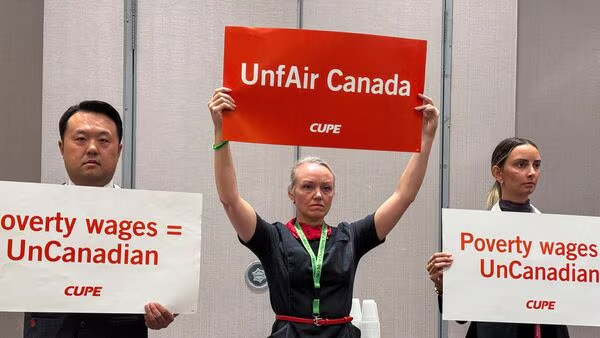In a significant labor dispute, over 10,000 flight attendants employed by Air Canada flight have chosen to remain on strike, defying a government-mandated back-to-work order. This action has led to the grounding of hundreds of flights and has significantly disrupted travel plans for thousands of passengers.
Background of the Dispute
The strike began on August 16, 2025, after months of stalled negotiations between the Canadian Union of Public Employees (CUPE), which represents the flight attendants, and Air Canada. The primary issues at the heart of the dispute are wage disparities and the lack of compensation for ground duties, such as boarding passengers and preparing the aircraft for departure. Currently, flight attendants are only compensated for time spent in motion, a policy that CUPE argues is outdated and unfair.
In response to the strike, the Canadian government intervened by invoking provisions of the Canada Labour Code, directing the Canada Industrial Relations Board (CIRB) to issue a binding arbitration order. The CIRB ordered the flight attendants to return to work by 2 p.m. on August 17, 2025. However, CUPE has rejected this order, labeling it unconstitutional and asserting that it infringes upon workers’ rights to fair compensation and collective bargaining.
The Union’s Position
CUPE has been vocal in its criticism of the government’s intervention, accusing it of siding with corporate interests over the rights of workers. The union argues that the back-to-work order undermines the principles of free and fair collective bargaining and sets a dangerous precedent for labor relations in Canada.
Mark Hancock, CUPE’s national president, expressed the union’s stance by stating, “Our members are not going back to work. We are saying no.” The union has called on Air Canada to return to the bargaining table to negotiate a fair and equitable contract that addresses the concerns of flight attendants.
Air Canada’s Response
Air Canada has condemned the union’s defiance of the CIRB’s order, labeling the strike as illegal. The airline had initially planned to resume operations on August 17 but postponed those plans to August 18 due to the ongoing labor action. The airline has stated that it intends to resume flights as soon as possible and is working to rebook affected passengers and provide refunds or credits where necessary.

In a statement, Air Canada emphasized that the union’s actions are causing significant disruptions to its operations and are affecting the travel plans of thousands of passengers. The airline has urged the union to comply with the CIRB’s order and return to work to minimize further disruptions.
Impact on Passengers and the Aviation Industry
The strike has had a profound impact on both passengers and the broader aviation industry. Approximately 700 daily flights have been grounded, affecting over 100,000 travelers. Air Canada, a major carrier within the Star Alliance network, plays a crucial role in both domestic and international air travel. The ongoing strike has led to widespread flight cancellations and delays, leaving many passengers stranded and uncertain about their travel plans.
The disruption has also had ripple effects throughout the aviation industry, impacting supply chains, cargo shipments, and other airlines that rely on Air Canada’s operations. The strike has highlighted broader issues within the airline industry, including concerns over labor practices, wage disparities, and the treatment of frontline workers.
Legal and Constitutional Considerations
The defiance of the back-to-work order raises significant legal and constitutional questions. CUPE has argued that the government’s intervention violates the Canadian Charter of Rights and Freedoms, particularly the right to free and fair collective bargaining. The union contends that the back-to-work order is an overreach of governmental authority and infringes upon workers’ rights to negotiate their terms of employment.
Legal experts have noted that while the government has the authority to intervene in labor disputes, such actions must be carefully balanced against the rights of workers. The outcome of this dispute could set a significant precedent for future labor relations in Canada and may prompt a reevaluation of existing labor laws and practices.
Public Support and Solidarity
The strike has garnered significant public attention, with many Canadians expressing support for the flight attendants’ cause. Demonstrations have been held at major airports across the country, including Toronto Pearson International Airport and Montreal’s Pierre Elliott Trudeau International Airport. Protesters have carried signs reading “Work without pay is theft” and “Fair wages for fair work,” highlighting the central issues of the dispute.
Solidarity from other labor unions and workers’ groups has also been evident, with various organizations voicing their support for CUPE’s stance. The widespread public backing underscores the broader concerns about labor rights and fair compensation in Canada.
Potential Resolutions and Outlook
The resolution of this dispute remains uncertain. The Canadian government has several options to enforce the back-to-work order, including seeking court intervention or introducing legislation to compel the flight attendants to return to work. However, such measures could further escalate tensions and may face legal challenges.
Experts suggest that a negotiated settlement between CUPE and Air Canada is the most viable path forward. Both parties have expressed a willingness to engage in dialogue, but significant differences remain regarding compensation and labor practices. The outcome of this dispute will likely depend on the ability of both sides to find common ground and reach a fair and equitable agreement.
Conclusion
The ongoing strike by Air Canada flight attendants represents a critical moment in Canadian labor relations. The defiance of a government-imposed back-to-work order underscores the deep-seated issues within the airline industry regarding worker compensation and rights. As the situation develops, it will be essential to monitor the actions of both the union and the airline, as well as the responses from the Canadian government and the public. The resolution of this dispute will have lasting implications for labor relations in Canada and may serve as a catalyst for broader discussions about fair labor practices and workers’ rights.
Read Next – Air Canada Flight Attendant Strike Grounds Operations and Halts Financial Guidance






